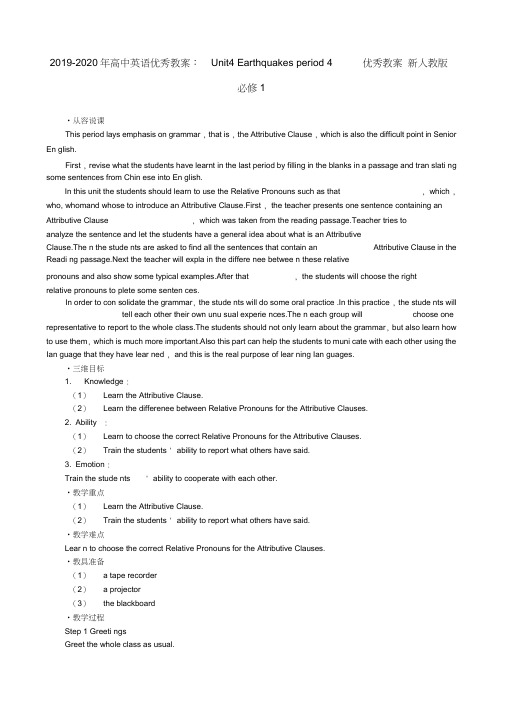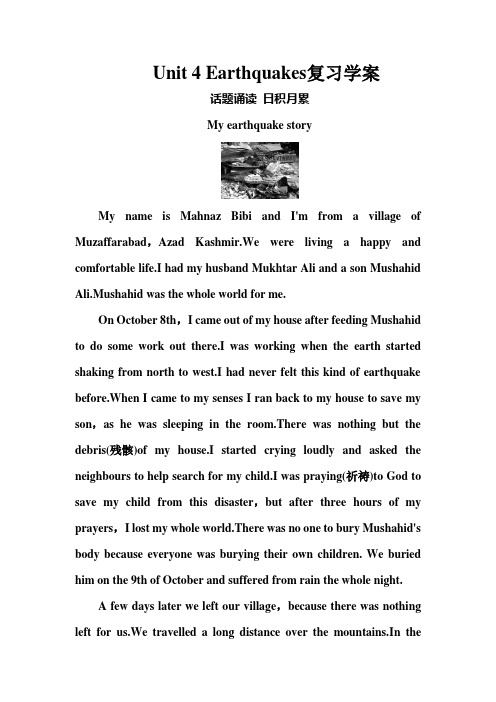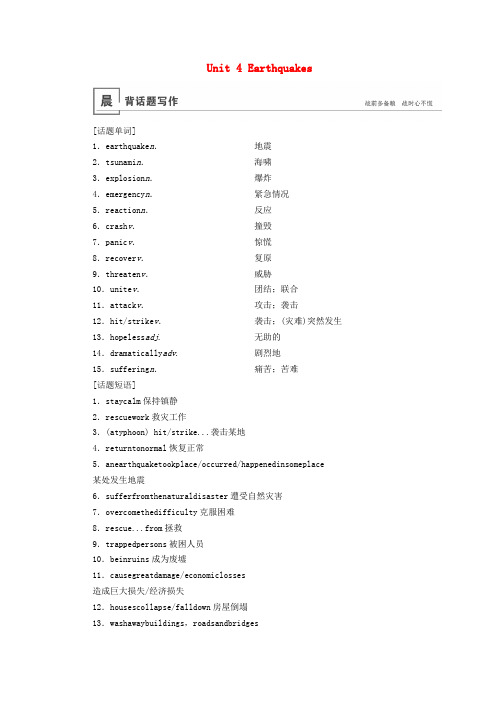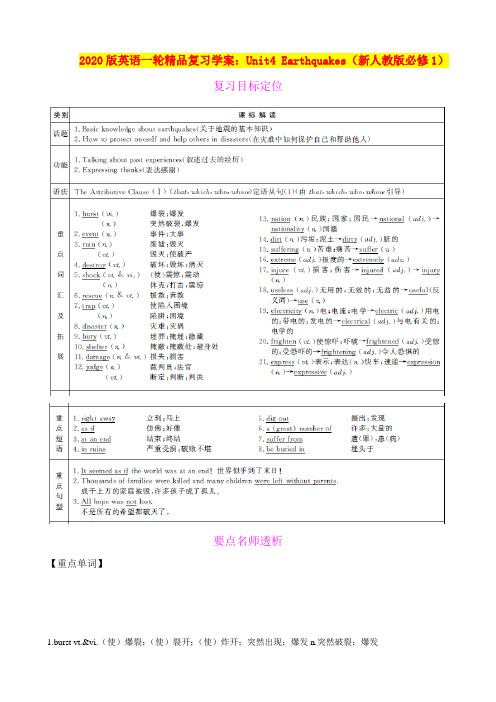2020届高三英语一轮复习教案: Unit 4 Earthquakes(新人教版必修1)
- 格式:doc
- 大小:177.50 KB
- 文档页数:10

人教版高中英语必修第一册 《Unit 4:Earthquakes》教案一、教学目标1.知识目标o学生能够掌握与地震相关的重点词汇和短语,如 “earthquake, ruin, destroy, rescue, shock” 等。
o学生能够理解并运用描述地震现象、危害和救援的句型和表达方式。
2.技能目标o学生能够听懂有关地震的简单对话和新闻报道,获取关键信息。
o学生能够阅读并理解关于地震的文章,分析文章结构和主旨。
o学生能够用英语简单讲述地震的相关知识和个人应对地震的措施。
o学生能够写一篇关于地震预防或救援的短文,表达自己的观点和建议。
3.情感目标o培养学生对自然灾害的认识和防范意识。
o激发学生的同情心和社会责任感,关注地震受灾地区和人群。
二、教学重难点1.教学重点o重点词汇和短语的记忆与运用。
o对课文中地震相关内容的理解和语言表达的学习。
o培养学生用英语描述地震和表达应对措施的能力。
2.教学难点o如何帮助学生理解地震的复杂科学原理和巨大危害,并能用英语进行准确描述。
o引导学生在写作中清晰、有条理地阐述地震预防或救援的观点和建议。
三、教学方法1.直观演示法:通过图片、视频等展示地震的场景和数据。
2.问题引导法:以问题为导向,引导学生思考和探究。
3.讨论交流法:组织学生讨论地震相关话题,促进学生之间的思想交流。
四、教学过程(一)导入(5 分钟)1.播放一段地震的视频片段,展示地震的破坏力。
2.提问学生:What do you see in the video? How do you feel about earthquakes?(二)词汇学习(10 分钟)1.呈现本单元的重点词汇和短语,结合地震的情景进行讲解。
2.通过词汇练习,如填空、选择等,巩固学生对词汇的理解和掌握。
(三)阅读前准备(5 分钟)1.让学生观察课文标题和图片,预测文章的主要内容。
2.提出一些引导性问题,如:What might the article talk about earthquakes?(四)课文阅读(15 分钟)1.学生快速阅读课文,概括文章的主旨。

必修1•从容说课This period lays emphasis on grammar , that is , the Attributive Clause , which is also the difficult point in Senior En glish.First , revise what the students have learnt in the last period by filling in the blanks in a passage and tran slati ng some sentences from Chin ese into En glish.In this unit the students should learn to use the Relative Pronouns such as that , which , who, whomand whose to introduce an Attributive Clause.First , the teacher presents one sentence containing an Attributive Clause , which was taken from the reading passage.Teacher tries toanalyze the sentence and let the students have a general idea about what is an AttributiveClause.The n the stude nts are asked to find all the sentences that contain an Attributive Clause in the Readi ng passage.Next the teacher will expla in the differe nee betwee n these relativepronouns and also show some typical examples.After that , the students will choose the rightrelative pronouns to plete some senten ces.In order to con solidate the grammar, the stude nts will do some oral practice .In this practice , the stude nts will tell each other their own unu sual experie nces.The n each group will choose one representative to report to the whole class.The students should not only learn about the grammar, but also learn how to use them, which is much more important.Also this part can help the students to muni cate with each other using the Ian guage that they have lear ned , and this is the real purpose of lear ning Ian guages.•三维目标1. Knowledge :(1)Learn the Attributive Clause.(2)Learn the differenee between Relative Pronouns for the Attributive Clauses.2. Ability :(1)Learn to choose the correct Relative Pronouns for the Attributive Clauses.(2)Train the students ' ability to report what others have said.3. Emotion :Train the stude nts ' ability to cooperate with each other.•教学重点(1)Learn the Attributive Clause.(2)Train the students ' ability to report what others have said.•教学难点Lear n to choose the correct Relative Pronouns for the Attributive Clauses.•教具准备(1) a tape recorder(2) a projector(3)the blackboard•教学过程Step 1 Greeti ngsGreet the whole class as usual.Step 2 Revisi onT: In the last period , we learned the usage of some difficult words and expressions.Now let ' s check your homework exercises.Look at Part 1 in Using Words and Expressions on Page 63.Describe an earthquake using the vocabulary in this un it.The n choose the words and expressi ons from the box to plete the passage.Cha nge the form if n ecessary.(One student reads the short passage.The teacher corrects any mistakes if there are any.) T: Then let ' s e to the next part.Translate the sentences into English using the words andexpressi ons in the brackets .I will ask some of you to read the sentences.S: The evening before last , she was too nervous to eat anything.S2:When people found there was a second quake , they rushed out of their houses right a way.S3:After that terrible disaster , 60 percent of the homeless children were sent to other safe cities to live.S4:To the north of the factory , a little girl was dug out of the ruins.S5:We are proud of the soldiers , who rescued those boys from the race.S6:We should honor those who organized the rescue work.T: You did a quite good job.Step 3 Grammar(The teacher writes the sentence “ Workers built shelters for survivors whose homes hadbeen destroyed. ” on the blackboard before class begins. )T: Please look at the sentence on the blackboard , paying special attention to the underlined part.What kind of clause is it ?Ss:The Attributive Clause.T: Yes.You are right.The Attributive Clause tells us which person or thing ( or what kindof person or thing ) the speaker means.e.g.The woma n who lives n ext door is a teacher.A sentence with an attributive clause is a bination of two shorter sentences." the sentenceabove , the two short sentences are : “ The womanis a teacher. ” and “ The womanlives next door.'The Attributive Clause is the answer to the question : Which woman is a teacher ?Would you try to divide the sample sentence on the blackboard into two short sentences ?S i: Workers built shelters for survivors.The survivors ' homes had bee n destroyed.T: That' s right.Now try to find all the sentences with Attributive Clauses in the Reading passage.(After several minu tes. )S2:But the one million people of the city , who thought little of these events , went to bedas usual that ni ght.S3:It was heard in Beijing , which is one hundred kilometers away.S4:A huge crack that was eight kilometers long and thirty meters wide cut across houses roads and can als.S s:The number of people who were killed or injured reached more than 400000.S6:The army organized teams to dig out those who were trapped and to bury the dead.T: Very good.Then which part of the Attributive Clause , do you think , is the most difficult one?S7:The relative pronouns.T: You have noticed that many exercises about the Attributive Clause are designed for thestudents to choose a better relative pronoun.So next I will say something about the mon relative pronouns.“ Who” is used for people.e.g.The man has been caught.He did the robbery.T The man who did the robbery has bee n caught.“Which” is used for things.e.g.The chair was a broken one.I sat in the chair.t The chair which I sat in was a broken one.“That” is used for things or people.e.g.A plane is a machine.It can fly.t A plane is a machine that can fly.Here is the boy.He damaged the vase.t Here is the boy that damaged the vase.“ Whose” is used instead of his/her/their.e.g.She is the girl.Her English is the best in our class.t She is the girl whose English is the best in our class.“Whom” is quite formal ,and in most cases it is all right to use who instead.But when whom has a preposition before it ,it cannot be replaced by who.e.g. (1)I wanted to see the woman.She had already left.t The woman whom/who I wanted to see had already left.(2)The workers ,some of whom stayed here for four years ,e from different countries.T:Nowlook at Part 2 in Discovering Useful Structures on Page 28.Try to plete each sentence using that ,which,who,or whose.(After several minutes. )S8:The terrible shaking of the building woke up all the people who were asleep.T:Oh,attention ,please.In this sentence we can 't use “whom”,because “whom” can 't act as a subject in the Attributive Clause.S9:So you mean“ who”can act as a subject ,while “whom”can act as an object in an Attributive Clause.T:Yes.And “who” can also act as an object in the Attributive Clause.Now ,let 's e to thenext sentence.S10:The next day people put up shelters in the open air with all kinds of things that/which they could find.S11:Several days later most of the buildings that had been damaged were repaired.S12:We went to see our teacher whose husband was killed in the earthquake.S13:A number of children whose parents had died in the quake were sent to live with families in other cities.T:You did a quite good job.Step 4 ConsolidationT:Nowwe are going to practice using the Attributive Clause.Think about an unusual experience and how you felt.Work in groups.Take turns asking questions ,using “Was it something that ?”or “Wasthere someone who?” Take notes about the experiences of your group members and report back to the class.(Ss work in groups.Meanwhile the teacher goes around the class and helps Ss deal with any difficulties that they may have. )(After several minutes. )T:Each group should choose one representative to make a report to the whole class.S1:Was it something that frightened you ?S 2: Yes , I was really frightened and felt terribly painful. S 3: Was there some one who came to help you ?S 4: Yes.Some passers-by came to help me and they sent me to the nearest hospital.S 5: While ridi ng a bike back home Xiao Mi ng was hit by a car.He fell dow n from the bike onto the ground.He felt terribly painful.Some passers-by came to help him and sent him to hospital.After exam in ati on , the doctors found his left leg was broke n.T : Excellent. Step 5 HomeworkT : After class , read the passage on Page 64.lt ' s about advice on how to protect your home from an earthquakeplete the sentences below , using who , whom which , that or whose. Secondplease translate the following sentences into English, using the Attributive Clauses.1. 她的父母不允许她嫁给任何家境贫寒的人。

话题4 自然灾害〔Unit 4 Earthquakes〕晨读背诵根底知识自测一、单词拓展(A)根据音标及词义写出英文单词。
1. event [ɪˈvent]n. 事件;大事2. dirt [dɜːt]n. 污垢;泥土→dirty [dɜːt ɪ]adj. 脏3. burst [bɜːst]vi. 爆裂;爆发;n. 突然破裂;爆发4. ruin [ˈruːɪn]n. 废墟;消灭;vt.〔使〕破产;消灭5. injure [ˈɪndʒə(r)]vt.& vi. 损害;伤害→injured [ˈɪndʒəd]adj. 受伤→injury [ˈɪndʒərɪ]n. 伤口6. useless [ˈjuːslɪs] adj. 无用;无效;无益7. destroy [dɪˈstrɔɪ]vt.破坏;毁坏→destruction [dɪˈstrʌkʃn]n. 破坏8. electricity [ɪˏlekˈtrɪsətɪ]n. 电;电流;电学→electric [ɪˈlektrɪk]adj. 用电;带电→electrical [ɪˈlektrɪkl]adj.与电有关9. rescue [ˈreskjuː]vt.& n. 援救;营救10. disaster [dɪˈzɑːstə(r)]n.灾难;灾祸11. shock [ʃɑk]vt.& vi. 〔使〕震惊;振动n. 休克;打击;震惊12. bury [ˈberɪ]vt. 埋葬;掩埋;隐藏13. mine [maɪn]n. 矿;矿山;矿井→miner [ˈmaɪnə(r)] n. 矿工14. frighten [ˈfraɪt(ə)n] vt. 使惊吓;吓唬→frightened [ˈfraɪt(ə)nd] adj. 受惊;受恫吓→frightening [ˈfraɪtnɪŋ] adj. 令人恐惧15. judge [dʒʌdʒ] n. 裁判员;法官vt. 判定;判断;判决16. sincerely [sɪnˈsɪəlɪ]adv. 真诚地;真挚地→sincere [sɪnˈsɪə]adj. 真诚;真挚(B)单词活用用所给词正确形式填空。

Unit 4 Earthquakes复习学案话题诵读日积月累My earthquake storyMy name is Mahnaz Bibi and I'm from a village of Muzaffarabad,Azad Kashmir.We were living a happy and comfortable life.I had my husband Mukhtar Ali and a son Mushahid Ali.Mushahid was the whole world for me.On October 8th,I came out of my house after feeding Mushahid to do some work out there.I was working when the earth started shaking from north to west.I had never felt this kind of earthquake before.When I came to my senses I ran back to my house to save my son,as he was sleeping in the room.There was nothing but the debris(残骸)of my house.I started crying loudly and asked the neighbours to help search for my child.I was praying(祈祷)to God to save my child from this disaster,but after three hours of my prayers,I lost my whole world.There was no one to bury Mushahid's body because everyone was burying their own children. We buried him on the 9th of October and suffered from rain the whole night.A few days later we left our village,because there was nothing left for us.We travelled a long distance over the mountains.In theend,we reached Muzaffarabad,Azad Kashmir and got shelter in the Ajaz Gillani Relief Tent Village.[词海拾贝]1.come to one's sense(s)清醒过来;冷静下来2.search for寻找,搜索3.suffer from遭受,忍受4.in the end最后,终于5.get shelter得到住处;得以避难[问题思考]1.Why did the author leave her village?_______________________________________________________ 答案:Because there was nothing left for her.2.What would you do if you felt an earthquake?_______________________________________________________ 答案:I would find a safety place or open field.自主预习步步提高词汇识记Ⅰ.将单词与其正确释义配对1.burst A.v i.爆裂;爆发n.突然破裂;爆发2.ruin B.v t.破坏;毁坏;消灭3.injure C.v t.埋葬;掩埋;隐藏4.destroy D.n.废墟;毁灭v t.使破产;毁灭5.shock E.v t.损害;伤害6.rescue F.v t.&v i.(使)震惊;震动n.休克;打击;震惊7.trap G.v t.使陷入困境n.陷阱;困境8.bury H.n.灾难;灾祸9.disaster I.n.&v t.援救;营救10.electricity J.n.电;电流;电学答案:1.A 2.D 3.E 4.B 5.F 6.I 7.G 8.C 9.H 10.J Ⅱ.根据所给汉语提示写出单词1.________n.地震________n.地震;震动2.________v i.爆裂;爆发n.突然破裂;爆发3.________n.废墟;毁灭v t.毁灭;使破产4.________n.苦难;痛苦5.________adj.极度的6.________v t.损害;伤害7.________v t.毁坏;破坏;消灭8.________adj.无用的;无效的;无益的________adj.有用的9.________n.休克;震惊;打击v t.&v i.(使)震惊;震动10.________v t.&n.救援;营救11.________v t.使陷入困境n.陷阱;困境12.________n.灾难;灾祸13.________v t.埋葬;掩埋;隐藏14.________n.遮蔽处;避身处;掩蔽15.________n.记者答案:1.earthquake quake 2.burst 3.ruin 4.suffering5.extreme 6.injure 7.destroy eless useful9.shock 10.rescue 11.trap 12.disaster 13.bury14.shelter 15.reporterⅢ.根据汉语提示写出正确的单词1.The driver lost control when a tyre__________(爆裂).2.The bad weather________(毁掉)our trip.3.Three people were killed and five__________(伤害)in the accident.4.The parents were________(震惊)by the news that their son needed an operation.5.Helicopters________(营救)nearly 20 people from the roof of the burning building.6.The train was________(困在)underground by a fire.7.The dog had________(掩埋)its bone in the garden.答案:1.burst 2.ruined 3.injured 4.shocked5.rescued 6.trapped 7.buriedⅣ.根据汉语提示写出正确的短语1.He behaves________(好像)he had no common sense.2.On November 11th,1918 the First World War was finally ________ (结束).3.The invader laid towns and villages________(严重受损).4.I went to the attic and________(发现)grandad's medals.5.There have been________(许多) accidents lately.6.Thank you.I will get in touch with him_________(立刻,马上).7.It is wrong to________(不把……当回事)everything.8.I found him in the garden,dreaming away____________(和往常一样).答案:1.as if 2.at an end 3.in ruins 4.dug out5.a great number of 6.right away 7.think little of8.as usual语篇理解Ⅰ.Skimming for the main informationPara.1________ A.The earthquake caused unbelievable destruction to Tangshan.Para.2________ B.The earthquake happened and causeddeaths or injuries in Tangshan.Para.3________ C.Help came soon after the quakes.Para.4________ D.No one paid attention though strange things happened.答案:Para.1—D Para.2—B Para.3—A Para.4—CⅡ.Scanning for detailed information1.All the following unusual things happened before the quake EXCEPT that________.A.the water in the village wells rose and fellB.the chickens and even the pigs were too nervous to eatC.tens of thousands of cows would never give milk againD.fish jumped out of their bowls and ponds2.Before the earthquake people were asleep as usual because________.A.they didn't notice anything strange happeningB.they knew well about earthquakesC.something strange happened in many placesD.they didn't realize the arrival of an earthquake3.When did the earthquake happen?A.At night on July 28,1976.B.On the morning of July 28,1976.C.On the afternoon of July 28,1976.D.The writer didn't tell us.4.Which is TRUE according to the passage?A.People paid much attention to those strange things before the earthquake.B.Before the earthquake animals became nervous.C.After the earthquake water was needed because there was no water in dams and wells.D.After the earthquake the people in Tangshan lost hope because they were homeless.5.What does the sentence“Slowly,the city began to breathe again”mean?A.The city will not die;it has hope and it can recover from the pain.B.The army sent 150,000 soldiers to Tangshan to help people.C.Hundreds of thousands of people were helped.D.Most of the 10,000 miners were rescued.答案:1.C 2.D 3.B 4.B 5.AⅢ.Intensive reading to finish the passageBefore Tangshan earthquake,strange things happened and a 1.______ gas came out from the 2.______ of wells and animals became nervous.At 3:42 am,everything began to 3.______.The cityturned into 4.______ in just fifteen seconds.Many people,including workers and doctors,came to 5.______ those trapped under the ter that afternoon,another big quake 6.______ Tangshan,killing,injuring more people and making more buildings 7.______.Soldiers were called in to help the rescue workers and teams 8.______ to dig out the trapped and bury the dead.Workers built 9.______ for survivors.Fresh water was taken to the city.Slowly,the city began to 10.______ again.答案:1.smelly 2.cracks 3.shake 4.ruins 5.rescue 6.struck 7.fall down 8.were organized 9.shelters10.breathe[阅读素养提升]What should we do to protect ourselves if an earthquake happened?_______________________________________________________ _______________________________________________________ 答案:1.Don't be nervous and keep calm.2.Protect your head by putting your bag on your head.3.Stay under your desk.4.Leave the classroom after the earthquake.[精读难句透析]1.The sound of planes could be heard outside the city ofTangshan even when no planes were in the sky.分析:本句是一个主从复合句。

Unit 4 Earthquakes[话题单词]1.earthquake n.地震2.tsunami n.海啸3.explosion n.爆炸4.emergency n.紧急情况5.reaction n.反应6.crash v.撞毁7.panic v.惊慌8.recover v.复原9.threaten v.威胁10.unite v.团结;联合11.attack v.攻击;袭击12.hit/strike v.袭击;(灾难)突然发生13.hopeless adj. 无助的14.dramatically adv. 剧烈地15.suffering n.痛苦;苦难[话题短语]1.staycalm保持镇静2.rescuework救灾工作3.(atyphoon) hit/strike...袭击某地4.returntonormal恢复正常5.anearthquaketookplace/occurred/happenedinsomeplace某处发生地震6.sufferfromthenaturaldisaster遭受自然灾害7.overcomethedifficulty克服困难8.rescue...from拯救9.trappedpersons被困人员10.beinruins成为废墟11.causegreatdamage/economiclosses造成巨大损失/经济损失12.housescollapse/falldown房屋倒塌13.washawaybuildings,roadsandbridges冲走房屋、道路、桥梁14.callonpeopletomakedonations呼吁人们捐赠15.takeonanewlook呈现新面貌[话题佳句]1.Inthepasthundredyears,therehavebeenfrequentnaturaldisasterssuchasfloods,droughts,andearthquakes.在过去的几百年里,经常发生诸如水灾、干旱和地震这样的自然灾害。

2020版英语一轮精品复习学案:Unit4 Earthquakes(新人教版必修1)复习目标定位要点名师透析【重点单词】1.burst vt.&vi.(使)爆裂;(使)裂开;(使)炸开;突然出现;爆发n.突然破裂;爆发①The excellent performance of Chinese competitors at the 29th Beijing Olympic Games caused bursts of applause.在第29届北京奥运会上,中国队队员的精彩表现赢得了阵阵掌声。
②She was bursting to tell him the good news.她急不可待要把好消息告诉他。
③The boy burst into tears on seeing the big dog.看到这条大狗后,男孩突然大哭起来。
2 ruin n.[U]毁灭,崩溃;毁坏;[C](pl.)废墟、遗迹v.(使)破产,(使)堕落,毁灭①The bank atepped in to save the company from financial ruin. 银行的介入使这家公司免于经济崩溃。
②My new shoes got ruined in the mud.我的新鞋被泥浆给糟蹋了。
③That one mistake ruined his chance of getting the job.正是这个错误断送了他得到那份工作的机会。
3 injure vt.损害,伤害①One of the players injured his knee and had to be carried off .一个队员膝盖受伤,不得不被抬至场外。
②This could seriously injure the company’s reputation.这会严重损害公司的声誉③Don’t harm your eyes by reading in dim light.不要在昏暗的灯光下看书,以免损害眼睛。
2020届一轮复习人教版必修一Unit4Earthquakes单元学案设计Natural disasters are terrible events. They are difficult for adults and children. But adults should not be afraid to talk to children about natural disasters. Talking can not stop natural disasters from happening. But talking can help children feel safer and less afraid of the future. Here are five things adults can do when children show fear of natural disasters.First, adults should be willing to talk with children. When children are allowed to talk about their fears, they feel safer. Sometimes, the best thing an adult can do is just listen. Whatever the fear, it is important to listen and be patient with the child.Second, let children ask questions. When answering their questions, it is best to give short, honest answers. If you do not know the answer, you can be honest and say that you do not know.Third, it is important to wait until a child is ready to talk about a natural disaster. Adults should not force children to talk.Fourth, help children feel safe. There are many ways to do this. One way is very simple: adults can tell frightened children that they love them. It is also important for children to do the same things they do every day. Simple things like going to school and eating dinner can help children feel normal.Fifth, use activities to help children communicate their fears. Heshani was 13 when the Indian Ocean tsunami (海啸) ruined her house in Sri Lanka. One year later, she was still living under the shadow (阴影) of the natural disaster. She did not like to visit her ruined house. And she did not want to talk about the problems her family had. However, she loved to write. And she often shared her feelings about the tsunami in her poems. Writing poems was a way for her to share her fears since she did not like to talk about them.Section_ⅠWarming Up & Reading — Pre-reading[原文呈现] [读文清障]A NIGHT THE EARTH DIDN'T SLEEPStrange things were happening in the countryside of northeast Hebei. For three days the water in the village wells①rose②and fell, rose and fell. Farmers noticed that the well walls had deep cracks③in them. A smelly④gas came out of the cracks. In the farmyards⑤, the chickens and even the pigs were too nervous to⑥eat. Mice ran out of the fields looking for places to hide⑦. Fish jumped out of their bowls and ponds. At about 3:00 am on July 28, 1976, some people saw bright lights in the sky. The sound of planes could be heard outside the city of Tangshan even when no planes were in the sky⑧. In the city, the water pipes⑨in some buildings cracked and burst○10. Bu t the one million⑪ people of the city, who⑫ thought little of⑬ these events⑭,were asleep as usual that night.At 3:42 am everything began to shake. It seemed as if⑮ the world was at an end⑯!Eleven kilometres directly⑰ below the city one of the greatest earthquakes of the 20thcentury had begun. It was felt in Beijing, which⑱ is more than two hundred kilometres away. One-third of the nation⑲ felt it. A huge crack that⑳ was eight kilometres long and thirty metres wide cut across○21 houses, roads and canals○22. Steam○23 burst from holes in the ground. Hard hills of rock became rivers of dirt○24. In fifteen terrible seconds a large city lay in ruins○25. The suffering○26 of the people was extreme○27. Twothirds○28 of them died or were injured○29 during the earthquake. Thousands of families were killed and many children were left without parents. The number of○30 people who were killed or seriously injured reached more than 400,000.①well [wel] n.井②rise vi.上升;升高(不及物动词,不用于被动语态)③crack [kræk] n.裂缝;噼啪声 vt.&vi.(使)开裂;破裂④smelly ['smelI] adj.发臭的;有臭味的⑤farmyard ['fɑːmjɑːd] n.农场;农家⑥too ... to ...太……而不能……⑦现在分词短语作伴随状语。
英语:Unit4《Earthquakes》教案(4)(新人教版必修1)Period Four模块Teaching goals1.To help students learn to read about past experiences2.To help students better understand “earthquake”3.To help students use some important words and expressions4. To help students identify examples of the attributive clause in the textTopicBasic knowledge about earthquake; how to protect oneself and help others in disasters Vocabularyearthquake, quake, well, pipe, burst, nation, canal, stream, dirt, ruin, suffering, extreme, injure, destroy, brick, dam, track, shock, rescue, trap, electricity, disaster, bury, mine, miner, shelter, title, reporter, bar, frighten, frightening, frightened, congratulation, judge, express, online, headline, cyclistExpressionsright away, as if, at an end, in ruins, dig out, a number ofFunction1.Talking about past experiencesIt was terrible when…It seemed as if …I remember…I felt…No longer after that…Luckily,…2.Expressing thanksI would like to express my thanks to…who…Here, I wish to exp ress my thanks for the great efforts…I’d also like to thank…No words are strong enough to express our…GrammarThe Attributive Clause (I) (that, which, who, whose)Teaching AidsMultimedia facilities课时Teaching goals:To help students learn about the usage of who, which, that and whose used in the attributive clauseTo discover useful words and expressionsTeaching ProceduresStep 1 Introduction1.Introduce the kinds of attribute and the positions of the attribute※He is an honest boy.We love our country.What’s your telephone number?Marx found it important to study the situation in Russia.※This is a flower basket.This is a basket full of flowers.This is a basket that I want to put flowers in.(单个的词作定语时要放于被修饰词的前面,短语或从句作定语时要放于被修饰词的后面。
Unit 4 Earthquakes[单词拼写应用]1.(2019·全国卷Ⅰ) Modern methods of tracking polar bear populations have been employed only since the mid1980s.跟踪(进展情况)2.(2017·全国卷Ⅱ)We were respectful of craft and focused on digging into the characters we were going to play.刻苦钻研;研究3.(重庆卷)He had a real gift for handling chores, sheltering me from unpleasant repair jobs.使免于;庇护[短语多维应用]1.burst vt.&vi.(使)爆裂;(使)裂开;(使)炸开;突然出现;爆发n.突然破裂;爆发(1)burst out+doing=burst into+n.突然……起来burst into 闯入burst in 闯进来;插话(2)burst with joy/happiness/anger非常高兴/勃然大怒burst into cheers爆发出欢呼声burst in on a meeting打断会议[基础练习]——单句语法填空①a.He burst in without knocking at the door, which made me very angry.b.He burst into the room without knocking at the door,which made me very angry.②Hearing that my dad would be back from London this week, I felt as if my heart would burst with joy.[链接写作]——完成句子/句式升级听到儿子在地震中丧生的坏消息,这对夫妇突然哭起来。
Unit 4 EarthquakesStep 1 课前准备——单元考点自查自测1.词汇分层级识记过关2.语境活用填写过关3.经典句式背诵仿写过关4.类词巧积累事半功倍(一)分门别类攻单词——识形辨意·拓展应用(二)写用结合记短语——译写短语·语境活用(三)仿写活用练句式——经典句型·仿写背诵Step 2 课堂探究——核心考点 点点突破1.重点难点考点学通练透2.归纳总结拓展开阔视野3.方法规律技巧权威点拨4.面面俱到打创高效课堂第一时段 Warming up & Reading1.burst vi.爆裂;爆发;突然迸发;冲;闯 n .突然破裂;爆发[教材原句] In the city, the water pipes in some buildings cracked and burst . 在市内,有些建筑物里的水管出现裂缝并爆裂开来。
(1)burst in/into 闯入;突然破门而入(2) ⎭⎪⎬⎪⎫burst out crying/laughing burst into tears/laughter 突然哭起来/笑起来burst with anger 勃然大怒单句语法填空①On hearing the news, Mary burst ________ laughter while Lucy burst out ________(cry).②Last night the room ____________(burst) into but nothing was taken away.[答案] ①into; crying②was burst2.ruin n.[U]毁灭;毁坏;崩溃;[常用复数]废墟;遗迹vt.(使)毁坏;成为废墟[教材原句] In fifteen terrible seconds a large city lay in ruins.在可怕的15 秒内,一座大城市成了废墟。
Ⅰ.联想记忆(根据提示写出相应的词汇以及相关短语)1.right_away立刻;马上→at once 立刻;马上2.burst vi.爆裂→burst_into tears=burst_out crying 突然哭起来3.as_if 仿佛;好像→as though 好像→even_if/even though尽管4.ruin n.废墟;vt.毁灭→in_ruins成为废墟5.injure vt.损害→the_injured 受伤的人6.bury vt.埋葬;掩埋→be buried_in 埋头于7.shelter n.掩蔽;避身处→shelter...from...保护某人不受……8.damage n. & vt.损失→do damage_to对……损伤→do good_to对……有好处→do harm to 伤害……9.judge vt.断定→judging_by/from...根据……判断Ⅱ.构词记忆(根据提示写出相应的词汇及其派生词)1.nation n.民族;国家→national adj.国家的;民族的2.dirt n.污垢→dirty adj.脏的3.extreme adj.极度的→extremely adv.极端地4.frighten vt.使惊吓→frightening adj.令人恐惧的→frightened adj.受惊的5.express vt.表达;n.快车;速递→expression n.表达;表情Ⅲ.语境填词(根据提示用适当的单词或短语填空)1.The earthquake(地震) left the whole area in_ruins(严重受损).Most buildings were destroyed(毁坏) and great damage(损害) was done to the mental health of the victims.2.In the disaster(灾难), a_great_number_of_miners(许多矿工) were buried(掩埋) underground.It took the rescue(救援) workers much time to dig them out(掘出).Luckily, most of them were still quite well and only some got injured(受伤的).3.The oil pipe burst(破裂), which frightened(使惊吓) the people and caused losses of millions of dollars.4.He burst_out_of(冲出) the house right_away(立刻) after he received a call as_if(好像) something urgent had happened.5.The prediction that many disasters(灾难) will happen and that the earth will be at_an_end(终结) soon shocked(震惊) all the people.Ⅳ.语境记忆(背诵语段,记忆单元词汇)The whole nation was shocked by the earthquake.It was really an extremely frightening disaster.Almost everything was destroyed and people suffered a lot.They needed shelters and electricity.They expressed their sincere thanks to the Party for immediate rescue.Ⅴ.课文原句背诵1.Everywhere_they_looked nearly everything was destroyed.人们无论朝哪里看,那里的一切几乎都被毁了。
2.Your speech was heard by a group of five judges,all_of_whom agreed that it was the best one this year.有5个评委听了你的演讲,他们都觉得你的演讲是今年最好的。
3.It_seemed_as_if the world was at an end!仿佛到了世界末日!Ⅰ.单项填空1.I wish to thank Professor Smith, without________help I would never have got this far. (2012·天津,7)A.who B.whose C.whom D.which答案 B解析句意为:我想要感谢史密斯教授,没有他的帮助我就不会走得这么远。
whose是关系代词,引导定语从句,表示“……的”。
考生容易误选C项,因为只看到了without whom语意上相当于without Professor Smith,而忽略了题干中的help。
若选C项的话,可去掉题干中的help。
(考查单元语法)2.Maria has written two novels,both of ________ have been made into television series. (2012·山东,23)A.them B.thatC.which D.what答案 C解析句意为:玛丽娅已写了两部小说,它们都已被拍成了电视剧。
分析题干结构可以看出:Maria has written two novels是一个完整的含“主谓宾”的句子。
如果后半句也是个完整的句子的话,那么题干中的两个分句中间缺少连接词and,故A项不正确。
由此不难看出空格处应用关系代词which引导非限制性定语从句,which代替先行词two novels。
that作关系代词不能放于介词之后;what不能引导定语从句。
分清句子结构是解答本题的关键。
(考查单元语法)3.Jack wasn’t saying anything,but the teacher smiled at him________he had donesomething very clever. (2011·湖南,33)A.as if B.in caseC.while D.though答案 A解析句意为:杰克什么也没说,但是老师朝着他笑,就好像他做了非常明智的事情一样。
as if好像;in case以防万一;while当……时候;而,却;though尽管。
由句意可知应选A项。
(教材原句:It seemed as if the world was at an end!)4.The ability________an idea is as important as the idea itself. (2011·湖南,21) A.expressing B.expressedC.to express D.to be expressed答案 C解析句意为:表达观点的能力和观点本身同等重要。
ability后通常跟动词不定式(短语)作后置定语,故排除A、B两项;此处the ability与express是逻辑上的主谓关系,表示主动意义,故排除D项。
(教材原句:I would like to express my thanks to...who...)5.After getting lost in a storm, a member of the navy team________four days later.(2011·上海,31)A.rescued B.was rescuedC.has rescued D.had been rescued答案 B解析考查时态。
句意为:迷失在暴风雨四天后,一名海军成员被救起。
由句中的时间状语four days later可知句子要用一般过去时,又a member of the navy team与rescue之间是被动关系,要用一般过去时的被动语态形式,故选B。
(教材原句:Some of the rescue workers and doctors were trapped under the ruins.)Ⅱ.完形、阅读——英译汉1.The restaurant called me right away and I thought to myself, this is going to be easy. (2012·湖南·完形)餐馆立刻给我打了电话,我心想这应该不难。
2.As soon as you hear it, you know the meeting is at an end. (2012·广东·阅读A)一听到这个你就知道会议结束了。
3.When she opened her eyes and saw her dog standing beside her, the girl said,“you rescued me, Laddy.”(2012·陕西·完形)当睁开眼睛看到自己的爱犬站在一旁,女孩说“Laddy,_是你救了我。
”4.Without knowledge, we may be completely destroyed by the danger. (2011·江西·阅读D) 没有知识,我们就可能被危险毁掉。
Ⅲ.书面表达——汉译英1.我不知道是小说中的什么东西使他突然泪如泉涌。
(burst into tears)(2012·湖北·书面表达) I don’t know what in the novel made him burst into tears.2.然而,有些课文有太多的难以理解的生词短语,因此我建议把这些文章换成简单点的。
(express) (2012·辽宁·书面表达) However, some of the texts have too many new words and expressions which are hard for us.Therefore, I’d like to suggest changing them into easier ones.历年高考热点:as if/though,express,right away,at an end,rescue,destroy,burst into tears,expression等的用法。